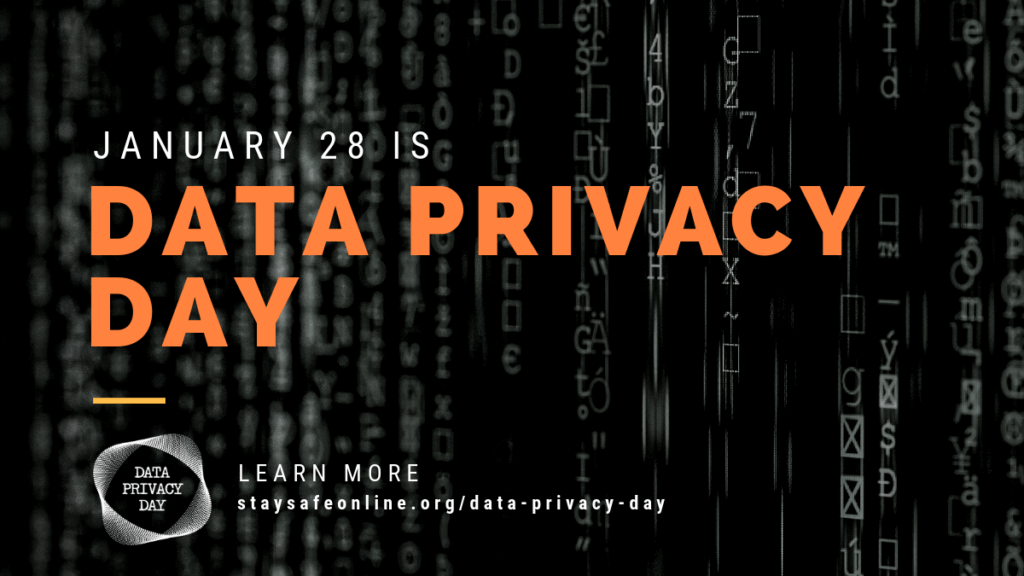Important Information About Data Privacy Day
Millions of people are unaware of and uninformed about how their personal information is being used, collected or shared in our digital society.
WHAT IS DATA PRIVACY DAY?
Data Privacy Day aims to inspire dialogue and empower individuals and companies to take action. It began in the United States and Canada in January 2008 as an extension of the Data Protection Day celebration in Europe. Data Protection Day commemorates the Jan. 28, 1981, signing of Convention 108, the first legally binding international treaty dealing with privacy and data protection. Data Privacy Day is observed annually on Jan. 28.
The National Cyber Security Alliance (NCSA) officially leads the Data Privacy Day campaign and is advised by a distinguished advisory committee of privacy professionals to help the campaign align with the most current privacy issues in a thoughtful and meaningful way.
Tips for Protecting data and Privacy
Create a culture of privacy in your organization. Educate employees on the importance and impact of protecting consumer and employee information as well as the role they play in keeping it safe.
Data SecurityTransparency and Trust:
- If you collect it, protect it.
Follow reasonable security measures to keep individuals’ personal information safe from inappropriate and unauthorized access. - Be open and honest about how you collect, use and share consumers’ personal information.
Think about how the consumer may expect their data to be used, and design settings to protect their information by default. - Build trust by doing what you say you will do.
Communicate clearly and concisely to the public what privacy means to your organization and the steps you take to achieve and maintain privacy.
Protecting Your Personal Data:
- Personal info is like money: Value it. Protect it.
Information about you, such as your purchase history or location, has value — just like money. Be thoughtful about who gets that information and how it’s collected through apps and websites. You should delete unused apps, keep others current and review app permissions.
Consumer Privacy
- Share with care. Think before posting about yourself and others online. Consider what it reveals, who might see it and how it could be perceived now and in the future.
- Own your online presence. Set the privacy and security settings on websites and apps to your comfort level for information sharing. Each device, application or browser you use will have different features to limit how and with whom you share information.
- Think before you act. Information about you, such as the games you like to play, your contacts list, where you shop and your geographic location, has tremendous value. Be thoughtful about who gets that information and understand how it’s collected through websites and apps.
- Lock down your login. Your usernames and passwords are not enough to protect key accounts like email, banking and social media. Strengthen online accounts and use strong authentication tools like a unique, one-time code through an app on your mobile device.
Healthcare and Digital Recording Keeping Data
Technology can greatly improve the delivery of medical and health services for patients. As healthcare companies turn to digital record keeping and internet-connected medical devices, patient outcomes are also improving. But these advances in healthcare technology also come with a risk: Medical organizations, including insurance companies, collect large volumes of data that we report on our devices, including our Social Security numbers, financial information, medical history and current health status. This data can be immensely valuable to cybercriminals and so intensely personal that patients would be deeply impacted if it was lost or stolen.
Recent statistics found that:
- In the U.S. alone, healthcare data breaches occur at a rate of more than one a day, costing an average of $408 per record.
- Four in five U.S. physicians have had cyberattacks in their practices, according to an Accenture survey.
- About 78 percent of respondents to a recent survey of healthcare professionals said they’d had either a malware and/or ransomware attack in the last 12 months.
- Under the Health Insurance Portability and Accountability Act (HIPAA), it’s illegal for healthcare providers to share patients’ treatment information. More than 30,000 reports regarding privacy violations are received each year.
- According to a recent HIMSS study, the vast majority of provider respondents (77%) cited medical identity theft as cybercriminals’ primary motivation.
- Insiders are also remaining a constant challenge for healthcare, accounting for 96 incidents or 41 percent of data breaches this year so far. More than 17 million patient records were breached by insider error or wrongdoing.
The above information is courtesy of StaySafeOnline and the National Cyber Security Alliance. For more, visit https://staysafeonline.org/wp-content/uploads/2019/01/DPD_ChampionBackgrounder_2019.pdf
Our Centre Secure Managed Services offer several layers of security to help keep company, user and customer data protected, including Employee Security Awareness Training. If you’d like more information, contact us today!





